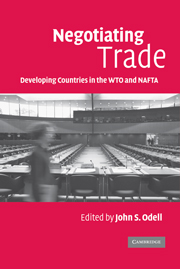Book contents
- Frontmatter
- Contents
- List of figures
- List of tables
- List of contributors
- Acknowledgments
- 1 Introduction
- Part I Multilateral negotiations
- 2 The evolution of national interests: new issues and North–South negotiations during the Uruguay Round
- 3 Reframing the issue: the WTO coalition on intellectual property and public health, 2001
- 4 The strict distributive strategy for a bargaining coalition: the Like Minded Group in the World Trade Organization, 1998–2001
- 5 Learning in multilateral trade negotiations: some results from simulation for developing countries
- Part II Regional negotiations
- Part III WTO Dispute Settlement Negotiations
- Index
3 - Reframing the issue: the WTO coalition on intellectual property and public health, 2001
Published online by Cambridge University Press: 22 September 2009
- Frontmatter
- Contents
- List of figures
- List of tables
- List of contributors
- Acknowledgments
- 1 Introduction
- Part I Multilateral negotiations
- 2 The evolution of national interests: new issues and North–South negotiations during the Uruguay Round
- 3 Reframing the issue: the WTO coalition on intellectual property and public health, 2001
- 4 The strict distributive strategy for a bargaining coalition: the Like Minded Group in the World Trade Organization, 1998–2001
- 5 Learning in multilateral trade negotiations: some results from simulation for developing countries
- Part II Regional negotiations
- Part III WTO Dispute Settlement Negotiations
- Index
Summary
Introduction
In November 2001 the World Trade Organization's ministerial conference in Doha adopted a Declaration on the WTO Agreement on Trade-related Aspects of Intellectual Property Rights (TRIPS) and Public Health. The process that led to this declaration is one of the most interesting episodes in recent international economic negotiations. A coalition lacking obvious power achieved significant, unexpected gains despite careful opposition from powerful transnational corporate firms and their home governments. This chapter seeks to explain this puzzling outcome and considers whether it suggests any generalizations that are likely to be useful in other cases.
Like all negotiation outcomes, this one has two dimensions: whether agreement was reached and the agreement's terms. Given the chasm between the two camps' perspectives, this agreement itself is surprising. Given the great power disparities, the gains of the developing countries are also surprising. These gains are defined relative to the status quo prior to the 2001 talks. The 1994 TRIPS agreement, whose origin is discussed in chapter 2 on the Uruguay Round, established obligations of WTO member states to comply with certain international rules protecting the rights of owners of patents and copyrights. Many national laws allow the government to violate patent rights under some conditions. Thus TRIPS too permitted countries to seize patents and issue compulsory licenses, for example authorizing a domestic firm to produce and sell generic equivalents of a brand name drug without permission from the foreign inventor. Such licenses were subject to specified conditions including adequate remuneration to the right holder.
- Type
- Chapter
- Information
- Negotiating TradeDeveloping Countries in the WTO and NAFTA, pp. 85 - 114Publisher: Cambridge University PressPrint publication year: 2006
- 40
- Cited by



